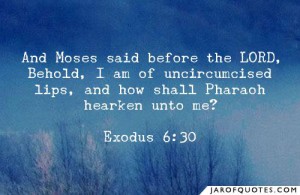[First posted in 2015; ‘lashon hara’ is the Hebrew equivalent for evil speech or evil tongue. How do we know if we’re guilty of such?—Admin1.]
————————-
A ‘search term’ most frequently entered in this website is the phrase “uncircumcised lips”. And of course, we do have a post with that phrase in the title which is not originally ours; it comes from a man recorded to have said it first, referring to himself: Moses. Later, the prophet Isaiah would use the same term, also referring to himself.
What? ?!! Handpicked mouthpieces of YHWH feel unworthy to utter ‘the very words of God’? Who chose them in the first place, shouldn’t that make them say “Who, me? How privileged am I!” Yet one sees their humility when they say instead, “but I am a man of uncircumcised lips!”
Moses and Isaiah, two towering figures in the Hebrew Scriptures you would least accuse of having “uncircumcised lips” . . . so what could it possibly mean? To save us from explaining and encourage you to do your homework, read this post first:
The first thing that should come to mind in our generation, living several millennia later is this: if we had the same assignment as Moses and we felt we were not a ‘fit vessel’ to deliver a message from no less than God Himself who appears as a ‘burning bush‘, would we use the same terms as Moses did? “Uncircumcised lips”? Most likely not; in fact that is why we think the post with those naughty words in the title is so popular with searchers, it is clicked so frequently.
The word ‘circumcision’ referring to a medical procedure applied to human genitalia is not normally nor casually used in our language and particularly applied to another part of the human body! Truly, how often would we use the term except to refer to the medical procedure that is performed only in cultures or religions that require it? And for what? These days there are pros and cons on circumcision being medically and hygienically beneficial to sexual partners regardless of different or same gender. But let us not get into that diversion here.
The word “circumcision” has been metaphorically applied such as “circumcision of the heart” and let’s not forget “people of the circumcision” (Israel) and “the uncircumcised” (Gentiles), specifically used at a time when Israel was identifiable specifically with that requirement for the male population. Movies about the holocaust use that same identifying process when Germans search out Jews from among the occupied European countries. (Note: Circumcision is the sign of the covenant with Abraham; and it was kept by both Isaac and Ishmael, and presumably the generations that were born and grew up in Egypt and all generations from observant Israel thereafter, presumably to this day.)
David says it dramatically before he slingshots Goliath,
“for who is this uncircumcised Philistine,
that he should defy the armies of the living God?”
[1 Samuel 17:26].
Why so graphic a term is used in biblical language should not surprise us; the Creator/Revelator/God of Israel who designed the human anatomy finds nothing wrong in using words we might not want to utter in polite conversation, if and specially if the meaning hits home like a bullseye, no further explanation needed; though understandably, the unschooled in literary or figurative speech struggle with such metaphoric use of words avoided in polite society. Examples are found in some prophets who used such words about idolatrous Israel as “whoring” and “lifting up your skirt” in sexually characterizing them as being unfaithful to their husband, YHWH. Whew, talk about “uncircumcised lips” indeed, we might say today to the foul-mouthed, “gargle with spiritual chlorox” instead of “circumcise your lips!”
How unfit are we to speak God’s words to others?
What about the Hebrew phrase lashon hara or evil speech/evil speaking? Is it the same as “uncircumcised lips”? When does speech become evil? When do we cross the line?
We know lying in all forms is ‘lashon hara‘ but when does speaking the truth become evil speech? We know the Torah is all and always about our treatment of ‘the other’ which includes friend and foe. When words hurt ‘the other’, is that a no-no? What are the criteria for one to cross the line in speaking the truth because it’s the wrong context?
Most of us who think we’re not the ones being addressed by most of the Decalogue would think:
- “well, I’m right with God in terms of commandments #1-3;
- I’m a Sabbath-keeper so I’m OK with #4;
- I honor my parents so I’m fine with #5;
- I don’t murder, commit adultery in keeping with #6 and #7;
- I don’t covet my neighbor’s spouse or goods, so there’s #9 and #10.
- What did I miss? #8—
Thou shalt not bear false witness against thy neighbor.
No problem, what I do say about my neighbor is all true! How could that be a violation?
Of course, there are contexts where the truth should be told regardless of the hurt it will cause another; such as —
- testifying in court;
- exposing wrongdoing for the good of another, if not the majority;
- protecting the interests of others (lies being said of an innocent party; spouse cheating on your friend or kin; etc.)
- you can think of other situations where truth must be told despite the hurt it will cost another, particularly if the purpose and the end is for the good of the innocent ‘other’ and justice is served the guilty ‘other’.
Now, are there circumstances and times when Truth should be withheld? The key to Torah-observance, besides obedience to God is to be ‘other-conscious’ and ‘other-centered’. So when does telling the truth hurt the other?
Ponder the message in this image:
Here is a Jewish perspective (always good to eventually check them out as the first or last recourse) from an article published: April 25, 2015 in one of our favorite Jewish websites listed on our link, aish.com:
http://www.aish.com/ci/s/Robert-Downey-Jrs-Awkward-Interview.htmlwritten
. . . many of us instinctively understand that words hurt and can do as much damage – or more – as physical harm. The Torah juxtaposes both types of harm: physical and verbal. After listing a long litany of ways that it is prohibited to cause another person financial or physical damage, the Torah admonishes—
“And you shall not wrong one another,
but shall fear your God…” (Leviticus 25:17).
To “wrong” in this context means to wound with words, and it’s considered infinitely worse than causing financial harm, for financial losses can be reversed, while emotional damage can be impossible to undo.
The Talmud provides a concrete example of what it means to wound with words:
“One must not say to someone who has changed their ways: Remember your former deeds” (Bava Metzia 58b).
Jewish law prohibits us to humiliate someone by bringing up his or her checkered past. People can change and their past no longer represents who they are now. It’s demeaning to straightjacket people with any label, all the more so with negative, outdated ones.
It’s easy to try to justify our speech by saying that our intentions were good, that we only brought up painful or awkward subjects in order to accomplish something important. That’s why the verse warning against humiliating another person concludes with the words “you shall fear your God.” The Almighty knows our true intentions. We can’t fool him.
So back to our title: “uncircumcised lips” in the context of Moses is not the same as “lashon hara” because he himself explains, he merely has a speech impediment and feels inferiority in speaking for YHWH God of Israel, to deliver a message to Pharaoh to let God’s people go. So elder brother Aaron is commissioned to be the spokesman and scripture records something unusual that Israel’s God YHWH said:
If not, good excuse to suggest one more post: Exodus/Shemoth 4 – Excuses, Excuses.
NSB@S6K



